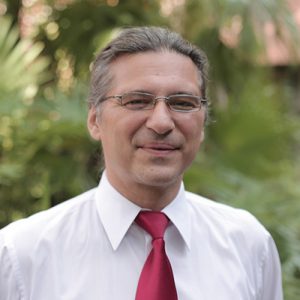GAINESVILLE, Florida – Bojan Lazarevic and Timothy Vetere, clinical assistant professors in the School of Teaching and Learning, have been selected as the 2022 College of Education Undergraduate Teacher of the Year and Mentor of the Year, respectively.
To encourage and reward excellence, innovation and effectiveness in undergraduate teaching, these awards are given to faculty members who excel in the classroom and as mentors.
As the leader of the Educational Technology undergraduate specialization and minor, Lazarevic said this award demonstrates that his students are happy with his teaching strategies and are satisfied with their learning environment. The most rewarding part of his work at the college is the people, he said, especially students.
“I’m mostly an online teacher, so I truly appreciate that interaction and the energy that really takes place here at the College of Education,” Lazarevic said.
Lazarevic has been teaching online for more than 20 years. Through this type of learning, he creates an accommodating environment and encourages dynamic communication to help his students express themselves.
“I think that’s the most important — to make a flexible environment that will support any choices students want to make or attempt to make in accordance to their needs or aspirations,” he said.
As a mentor, it is essential to understand students’ personalities, Lazarevic said. Instead of telling them what to do, he tries to identify their needs to facilitate development. At the start of each semester, Lazarevic establishes optimal interaction with students and designs courses in a way that allows them to connect with each other.
“I would say mentorship is important to provide that kind of wind to their sails,” he said.
As part of his approach, Lazarevic tries to be as present as possible in his courses. He accomplishes this by posting lots of video announcements and providing his students with audio feedback, which is a recorded response to their work.
He also encourages his students to submit their assignments in podcast, video, animation or essay format, motivating them to choose an approach that suits them and their strengths. All these methods combined contribute to a sense of community, he said.
“I think that’s the key, especially for online environments and for the online instructors,” he said. “Reinforcing the teaching presence can be filled with student success.”
Everyone needs human connection, Lazarevic said, and he uses techniques to reinforce this in an online environment. We look at phones and computers for hours each day, but it’s important to recognize there are people behind those screens — not just names or links.
“Those are actually humans — personality beyond the link,” Lazarevic said.
As the 2022 COE Mentor of the Year, Vetere feels being a teacher means helping students achieve their goals, especially through advising.
“I care very deeply about my students,” Vetere said. “I’m very proud of them and proud of the work that they do.”
For Vetere, establishing relationships with his students all starts with listening. He makes time to learn who his students are, their goals and their challenges. He capitalizes on his students’ strengths while also observing where they can grow.
Specifically, Vetere creates curriculum elements where students can showcase parts of themselves. He teaches different kinds of students each semester, motivating him to constantly better his practice.
“I feel like I have accomplished something when my students have accomplished something — whatever that might look like,” Vetere said.
Student feedback is important to Vetere. At the end of each class, he asks his students for questions, comments, concerns or criticisms, so he can be responsive to their needs. He also emphasizes his open-door policy.
Taking a learner-centered approach to teaching, Vetere looks beyond the classroom and into students’ futures as educators. One day, Vetere’s students will be responsible for all kinds of learners. He hopes to instill a sense of lifelong curiosity in them.
“One of the things that I really like about working with UF students is that they don’t see things just as how they are,” Vetere said. “It’s what things can be, so they’re never satisfied with the status quo.”
Going forward, Vetere hopes to get more faculty involved in the mentorship and advising of undergraduate students, especially first generation, transfer and minority students, through a formalized program.
UF is a big place, Vetere said, which can overwhelm undergraduate students. Having a faculty member to support you can make a big difference.
“I always tell my students that once you’re my student, you’re always my student,” Vetere said. “You can always come back to me, and you can always send me emails.”

Bojan Lazarevic

Timothy Vetere






